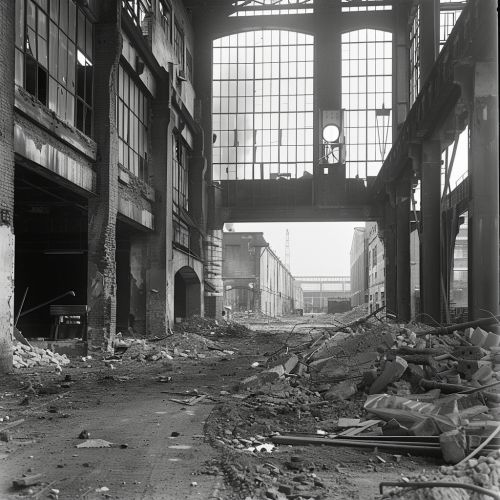Industrial organization
Overview
Industrial organization is a field of economics that studies the behavior of firms in the marketplace with regard to production, pricing, and other business strategies. It also examines the effects of government regulation and market competition on firm behavior. The field is closely related to game theory, microeconomics, and business strategy.
History
The field of industrial organization has its roots in the work of 19th-century economists such as Adam Smith and David Ricardo, who were interested in understanding the dynamics of industries and markets. However, it was not until the 20th century that the field began to take shape as a distinct area of study. The term "industrial organization" was first used in the 1930s by Edward Chamberlin and Joan Robinson, who were interested in understanding the structure of markets and the behavior of firms.


Theoretical Framework
Industrial organization uses a variety of theoretical models to analyze different aspects of firm behavior and market structure. These models are often based on the principles of game theory and microeconomics, and they are used to predict how firms will behave under different market conditions.
Market Structure
One of the key concepts in industrial organization is market structure. This refers to the number of firms in a market, the ease with which new firms can enter the market, and the degree of product differentiation. There are four main types of market structure: perfect competition, monopolistic competition, oligopoly, and monopoly.
Firm Behavior
Another important concept in industrial organization is firm behavior. This refers to the strategies that firms use to maximize their profits, such as setting prices, choosing output levels, and making investment decisions. Firm behavior is heavily influenced by market structure and the actions of other firms in the market.
Government Regulation
Industrial organization also studies the effects of government regulation on firm behavior and market structure. This includes antitrust laws, which are designed to prevent firms from engaging in anti-competitive behavior, and regulatory policies, which are designed to protect consumers and promote competition.
Empirical Methods
Industrial organization uses a variety of empirical methods to test its theoretical models and analyze real-world markets. These methods include econometric analysis, case studies, and experimental economics.


Econometric Analysis
Econometric analysis is a statistical method that is used to estimate the relationships between different variables. In the context of industrial organization, econometric analysis is often used to estimate the effects of market structure and firm behavior on prices, output levels, and other market outcomes.
Case Studies
Case studies are in-depth examinations of specific firms, industries, or markets. They are often used in industrial organization to gain a deeper understanding of the dynamics of a particular market or the behavior of a particular firm.
Experimental Economics
Experimental economics is a method that uses controlled experiments to test the predictions of theoretical models. In the field of industrial organization, experimental economics is often used to study the effects of different market structures and firm behaviors on market outcomes.
Applications
The theories and methods of industrial organization have a wide range of applications in both the public and private sectors. These include antitrust policy, regulatory policy, business strategy, and economic forecasting.


Antitrust Policy
Industrial organization plays a key role in the formulation of antitrust policy. By analyzing the structure of markets and the behavior of firms, industrial organization can help policymakers identify anti-competitive practices and design effective remedies.
Regulatory Policy
Industrial organization also contributes to the design of regulatory policies. By studying the effects of regulation on firm behavior and market outcomes, industrial organization can help policymakers evaluate the effectiveness of existing regulations and develop new ones.
Business Strategy
The theories and models of industrial organization can also be used to inform business strategy. By understanding the dynamics of their industry and the behavior of their competitors, firms can use the insights of industrial organization to make strategic decisions about pricing, production, and investment.
Economic Forecasting
Finally, industrial organization can be used to forecast economic trends. By analyzing the structure of markets and the behavior of firms, industrial organization can help forecasters predict changes in prices, output levels, and other market outcomes.
